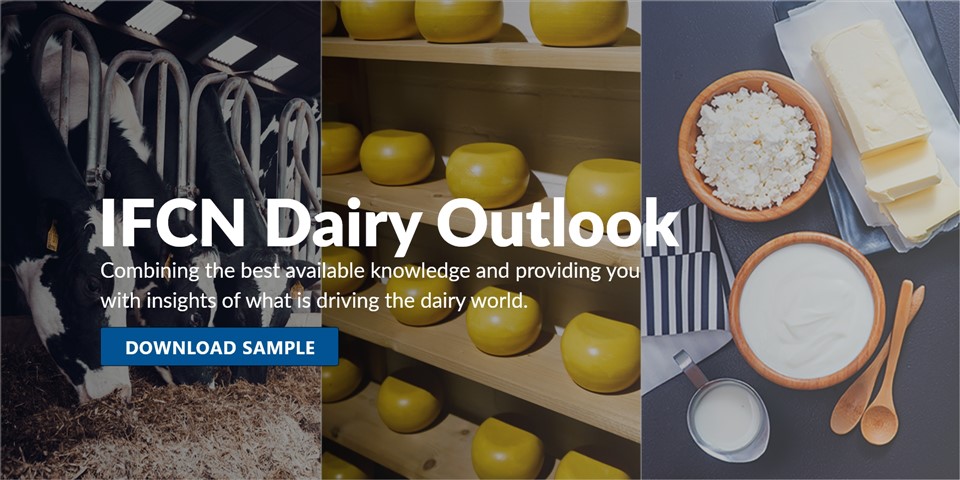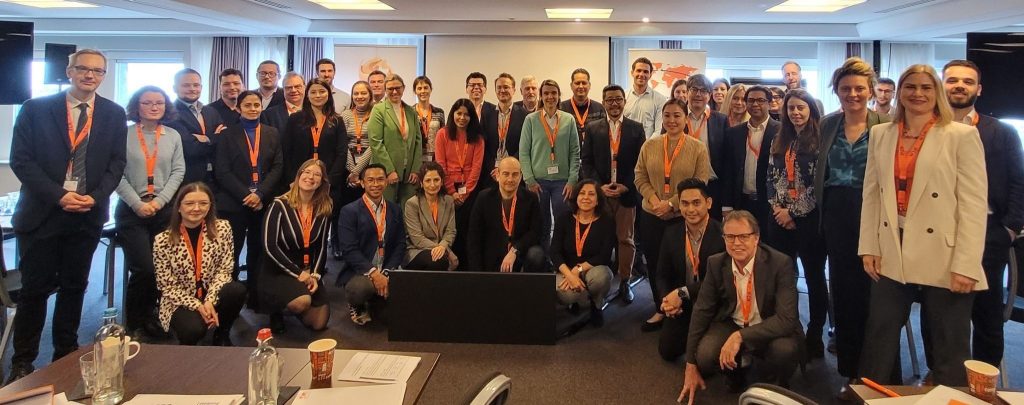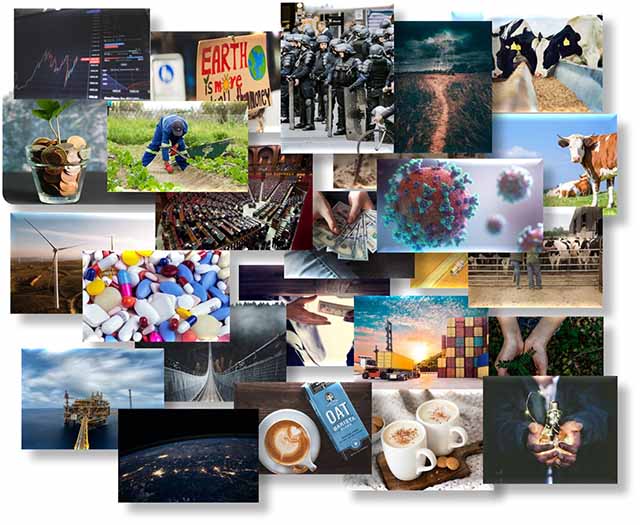Press Release: 3rd Dairy Outlook Workshop 2024
We have past turbulent years: After the record-high world milk price of above 60 USD /100kg solid corrected milk in winter 2022, the current world price level is at 42 USD /100 kg solid correct milk in March. Raw milk production is suffering under current circumstances of low milk payments and increasing costs of production – especially in the EU. So, the question is: Less milk: More action & better valorization?” This was the starting point for the two-day interactive workshop organized by Eucolait and IFCN, which brought together 49 participants from 32 different companies and institutions.
Under current dairy market conditions, a shrinking global milk supply is meeting unstable global demand due to inflation and commodity price levels. Farm profitability is under increasing pressure due to high-cost levels, increasing interest rates and uncertain circumstances for investments or farm succession. Economic challenges are accompanied by rising uncertainty about future political stability and decision-making, environmental regulations, and trade agreements. The dairy industry is in a phase of a fundamental change. The dairy world is accelerating. With the help of the workshop, IFCN and Eucolait aimed to bring representatives of the whole dairy supply chain together to discuss solutions for the dairy future.e.
Hard times breed innovation to overcome global milk scarcity.
The mid-term future of global demand growth looks promising thanks to an increasing middle class globally, while milk supply is the main determinant for price developments in the future. Understand these dynamics is crucial to secure the businesses involved in dairy, especially nowadays with rising uncertainties. To overcome future challenges and turn them into opportunities, partnerships and cooperation within dairy stakeholders are key and the “investment” will pay off. Additionally, the focus should lie on new solutions to improve efficiency and productivity along the whole dairy supply chain, e.g. “better” cow genetics.

IFCN predicts a modest price upturn on the back of weak supply and improving demand.
It looks that two factors are now losing their influence on price levels:
a) buffer stocks generated during the sharp milk and commodity production increase following the 2022-price-peak and
b) Chinese sharp raw milk pool output growth in the period 2020-2023 that may not sustain in the magic Year of the Dragon.
In simple terms: it looks like there are no more limits holding commodity prices down. This applies especially to the fat side of the dairy equation and so far, we interpret this not as a demand explosion, but rather as a (fat) supply shortage. The result is the same, but the cause is different. This has implications: Demand may shy away easier / negatively respond stronger to high prices in a weak, recessionary economy than in a buoyant economy. Overall, sadly enough, we observe an increasingly divided world. It is bad for trade. Part of the EU demand for dairy exports, e.g., to North Africa and the Gulf, is now reportedly triggered by higher transportation cost and longer delivery times from shipments from Oceania and Asia, due to the increased risk of merchant shipping through the Red Sea. So, we observe a basis for stronger dairy commodity prices but only until, in times of further dropping feed prices, farm incomes in response pick up, even when with some delay. That would trigger farm outputs going up. In the recessionary and geopolitically uncertain climate we are in, just a little bit extra supply and just a little bit downward demand due to elasticity may be enough to make prices peak and slide down again. One swallow does not make structural spring for farmers and processors given the increased cost both post-the-inflation-peak structurally face.
Food security as strategic resource like energy
It became clear during the event that there are a lot of uncertainties and market disruptors facing the dairy industry: There is a general shortage of food and difficulties in securing global food production. That’s why food security is a global issue and that will affect the EU under their zero-hunger ambition. The trade-off: With the EU Green Deal and Farm to Fork strategy the milk supply growth is expected to be limited as the agricultural sector has to produce more output with less input. Although the EU Agri Outlook sees growth potential for EU dairy exports due to rising demand for special varieties of dairy commodities which are produced within Europe. That’s why, Europe needs a higher valorisation of every 100 kg of milk produced by added value of the end product e.g. special kind of cheeses or butter and should not compete with cheaper production systems like Oceanian powders. One crucial factor is to secure the future milk supply. To maintain milk supply, it is needed to bring more attention to the farm economic situation in EU and other world regions as this is the major determinate for farmers to produce milk and with this also “feeding the world”. Another solution might be, reducing food waste globally, which can generate up to additional one third of total food production and increase food security worldwide.
Understand market and especially farm economics to predict the future
At the end, the conclusion of the participants was that there are plenty of reasons to have an optimistic view of the future and not everything should be seen as pessimistic. That’s why everyone should take the current and upcoming challenges as an opportunity to show society that the dairy industry is willing and able to act on time. In this sense, let us keep the milk moving.
The IFCN Outlook offers up to 12-months forecasts for dairy commodity prices, farm-gate milk prices, feed prices, dairy farm margins and raw milk pool sizes for 65 countries, accounting for 92% of global milk production. IFCN and Eucolait will continue to monitor developments and are glad to take on the challenge of continuing to connect dairy stakeholders and thank everyone for their active participation. If you want to keep an eye on this development and are interested in dairy market forecasts or workshops, please feel free to contact us.

About us
About Eucolait: Eucolait has been the voice of the European dairy trading community since 1959. They provide policy analysis, market intelligence and tailored advice to their members, represent their interests towards European and other institutions and act as a platform for events and discussion.
About IFCN: IFCN is a global research and consultancy network for the dairy industry based in Kiel, Germany. Founded in 2000, IFCN now brings together more than 100 researchers and makes its unique knowledge available through data services to more than 130 companies in the global dairy supply chain. Customers use IFCN analyses to adapt to the rapidly changing industrial landscape and new requirements, as well as to connect with industry colleagues.







